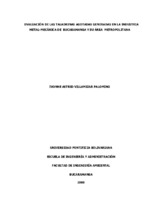| dc.contributor.advisor | Mantilla Ardila, Martha Rocío | |
| dc.contributor.author | Villamizar Palomino, Ivonne Astrid | |
| dc.coverage.spatial | Seccional Bucaramanga. Universidad Pontificia Bolivariana. Escuela de Ingenierías. Facultad de Ingeniería Ambiental | spa |
| dc.coverage.temporal | 2008 | |
| dc.date.accessioned | 2013-06-21T20:31:51Z | |
| dc.date.available | 2013-06-21T20:31:51Z | |
| dc.date.created | 2008-04-16 | |
| dc.date.issued | 2013-06-21 | |
| dc.identifier.uri | http://hdl.handle.net/20.500.11912/330 | |
| dc.description | 135p.:(pdf); il; tablas; gráficas; anexos | spa |
| dc.description.abstract | La gestión integral, tiene por objeto prevenir la generación de residuos o desechos peligrosos, así como regular el manejo de los residuos o desechos generados, con el fin de proteger la salud humana y el ambiente. Este concepto de la integración del factor medioambiental en todas las políticas sectoriales, es un principio esencial de la acción y contribución para la toma de conciencia frente a la situación medio ambiental global; es por esto que la implementación de técnicas de estudio, planes y programas tendientes a lograr una recuperación, recolección, transporte y aprovechamiento de los residuos peligrosos de la industria metal mecánica, generará grandes beneficios económicos, ambientales y sociales, minimizando al máximo su impacto ambiental y aportando medidas orientadas a la reducción en la producción de las mismas, tanto en cantidad como en peligrosidad. El trabajo se inició realizando la selección de las empresas del sector metal-mecánico, que optimizan las condiciones físico-químicas de la zona de contacto con los aceites solubles, conocidos como taladrinas, las cuales colaboraron con este libro, ofreciendo una visión actual y del futuro sobre el sector, en aspectos de organización y distribución del producto, procesos significativos en la generación de taladrinas agotadas, muestreo de los parámetros de calidad durante el proceso, disposición final actual del residuo, el cual ha contado con el apoyo de la Corporación Autónoma de la Meseta de Bucaramanga CDMB El desarrollo de este trabajo conlleva a determinar el diagnóstico de las taladrinas agotadas, la evaluación de parámetros de calidad de estos residuos; el análisis de las alternativas de gestión de la cadena metal- mecánica con respecto a estos residuos peligrosos y la seguridad industrial; Además de un análisis de la legislación existente en Colombia comparada con la normatividad Europea | spa |
| dc.description.abstract | The integral administration has for object to prevent the generation of residuals
or dangerous waste, as well as to regulate the handling of the residuals or
generated waste, with the purpose of protecting the human health and the
atmosphere.
This concept of the integration of the environmental factor in all the sectoral
politicians, is an essential principle of the action and contribution for the taking
of conscience in front of the global half environmental situation; it is for this
reason that the implementation of technical of study, plans and programs to
achieve a recovery, gathering, transport and use of the dangerous residuals of
the industry metal mechanics, will generate big economic, environmental and
social benefits, minimizing to the maximum their environmental impact and
contributing measures guided to the reduction in the production of the same
ones, as much in quantity as in danger.
The work began carrying out the selection of the companies of the sector
metal-mechanic that you/they optimize the physical-chemical conditions of the
contact area with the soluble oils, well-known as taladrinas, which collaborated
with this book, offering a current vision and of the future on the sector, in
organization aspects and distribution of the product, significant processes in
the generation of out taladrinas, sampling of the parameters of quality during
the process, current final disposition of the residual, which has had the support
of the Autonomous Corporation of the Plateau of Bucaramanga CDMB
The development of this work bears to determine the diagnosis of the out
taladrinas, the evaluation of parameters of quality of these residuals; the
analysis of the alternatives of administration of the chain metal - mechanics
with regard to these dangerous residuals and the industrial security; besides an
analysis of the existent legislation in Colombia compared with the European. | |
| dc.language.iso | es | |
| dc.rights | Attribution-NonCommercial-NoDerivatives 4.0 International | * |
| dc.rights.uri | http://creativecommons.org/licenses/by-nc-nd/4.0/ | * |
| dc.subject | Ingeniería ambiental | spa |
| dc.subject | Tesis y disertaciones académicas | spa |
| dc.subject | Residuos peligrosos | spa |
| dc.subject | Industria metalmecánica de Bucaramanga | spa |
| dc.subject | Medio ambiente | spa |
| dc.subject | Taladrinas | spa |
| dc.subject | ambiente global | spa |
| dc.subject | Impacto ambiental | spa |
| dc.title | Evaluación de taladrinas agotadas generadas en la industria metalmecánica de Bucaramanga y su área metropolitana. | spa |
| dc.type | bacherlorThesis | spa |
| dc.rights.accessRights | openAccess | spa |
| dc.type.hasVersion | publishedVersion | spa |
| dc.identifier.instname | instname:Universidad Pontificia Bolivariana | spa |
| dc.identifier.reponame | reponame:Repositorio Institucional de la Universidad Pontificia Bolivariana | spa |
| dc.identifier.repourl | repourl:https://repository.unab.edu.co/ | |


